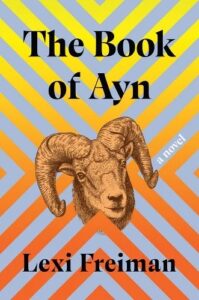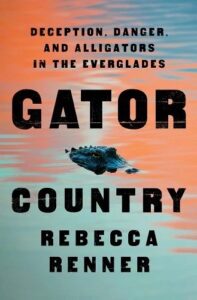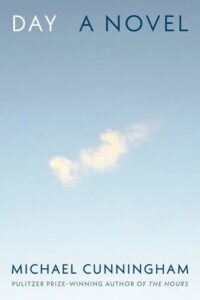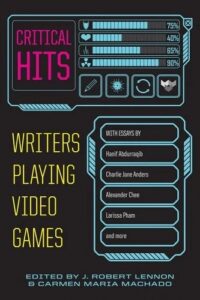NOVEMBER
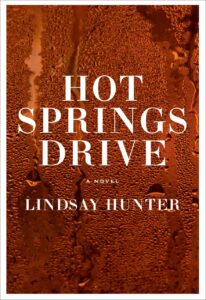
Lindsay Hunter, Hot Springs Drive
Roxane Gay Books, November 4
I love Hunter’s visceral, gritty writing, which is always packed tight with emotion and resonance; her latest novel, the third book to be published by Roxane Gay’s new imprint, sounds right in line with the rest of her work, taking on motherhood, friendship, and the casual horrors of suburbia, and described as “an urgent, vicious blade of a novel about a shocking betrayal and its aftermath, asking just how far you’ll go to have everything you want.” –ET
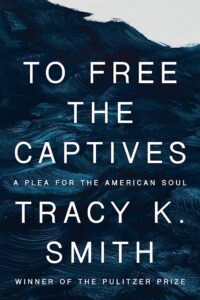
Tracy K. Smith, To Free the Captives: A Plea for the American Soul
Knopf, November 7
One of our most brilliant literary minds—the Pulitzer Prize-winning poet Tracy K. Smith—takes, as Eddie S. Glaude Jr. put it, “a vulnerable, honest look at a life lived in a country still struggling with its evils.” Blending the personal and the historical (inextricable anyway), this promises to be a moving and important book. –ET
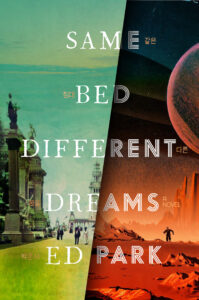
Ed Park, Same Bed Different Dreams
Random House, November 7
Sometimes the simulation is a little on the nose—you see the glitches when trying to make sense of the world in its current iteration. So goes the present-day US for a handful of characters clumped under the “Asian-American” label in Ed Park’s witty and inventive new novel Same Bed Different Dreams, which hinges on a revisionist history in which the Korean Provisional Government of 1919 survives to strategize reunification from behind the Red Window Shade.
What did it mean to be Korean, rather than Japanese, wonders a character whose ethnic inheritance has been shrouded by the aftermath of World War II, a sentiment that extends to cultural touchpoints in the present era, from the Stanley Cup to failing lit mags to the tech aspirations of your local HR department. The novel houses a dream inside a story inside a flashback, and brings together the histories of Soon Sheen, a programmer at a nefarious tech company (GLOAT), Parker Jotter, a Korean war vet turned appliance story owner, Monk Zingapan, a game designer, and Story (Astoria), Soon’s gaming child. Park’s alternate history is written with a dedication to invented facts rivaling Biography of X and The Man in the High Castle. Hurry to snatch a copy, then take your time so you don’t miss all the Easter eggs. –JM
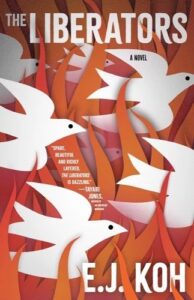
E.J. Koh, The Liberators
Tin House, November 7
The first novel from Koh, poet, translator, and author of the 2020 memoir The Magical Language of Others is a family epic that investigates the reverberations of immigration, divided loyalties, the American Dream, love, memory, and inheritance through four generations. Almost certain to be a beautiful, heartbreaking book. –ET
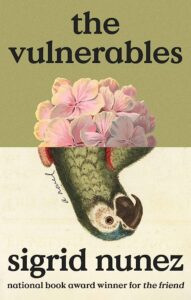
Sigrid Nunez, The Vulnerables
Riverhead, November 7
I’ve since explored Sigrid Nunez’s backlist, but like a lot of people, I first encountered her work through The Friend (about a woman grieving her friend, alongside his Great Dane), then What Are You Going Through (about a woman helping her friend end her life, alongside a cat). The Vulnerables makes it a trio, though I don’t think you could successfully accuse her of planning it that way, given that it’s about the Covid-19 pandemic. Specifically, it’s about a solitary woman who finds herself in lockdown with a parrot and a college-aged guy she initially loathes, then comes to tentatively connect with over their stoned conversations. (It’s about more than that of course, but you get the gist.) Say what you will about pandemic fiction, but I’m grateful that 30 or 40 years from now, when I have only a vague memory of what those years were like, I’ll have this book and its ilk to remind me. –ES
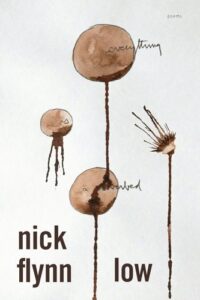
Nick Flynn, Low
Graywolf, November 7
I’m always interested in reading a new collection from Nick Flynn; this one “explores the jaggedness of memory and what is salvageable when the past is broken by loss, violence, and trauma” and features not only poems but essayish prose pieces. Can’t wait to dive in. –ET
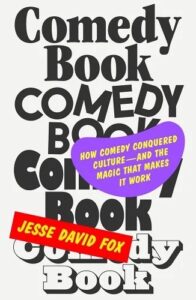
Jesse David Fox, Comedy Book: How Comedy Conquered Culture—And the Magic That Makes It Work
FSG, November 7
Comedy is very difficult to write compellingly about, but as Vulture’s comedy critic, Fox has consistently produced some of the best work about comedy that I’ve ever read. Comedy Book looks at the current cultural dominance of comedy and the legacies of some of its power players, and, in a more personal vein, its power to salve grief. –JG
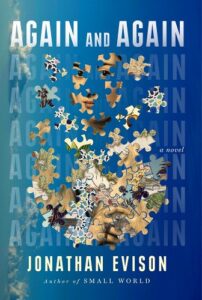
Jonathan Evison, Again and Again
Dutton, November 7
Gotta say I love the sound of this one, from the always funny and big-hearted Evison: it starts in a nursing home, where a grumpy resident named Geno informs his nursing assistant that in fact he has lived a thousand years, life after life, each one in thwarted pursuit of the true love he found and lost back in medieval Spain. Sure, okay, but there any possibility that he’s telling the truth? I will be reading to find out. –ET
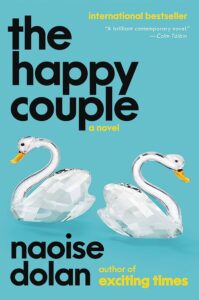
Naoise Dolan, The Happy Couple
Ecco, November 7
I loved Naoise Dolan’s 2020 novel, Exciting Times (remember the toothbrushes on the cover?), so I’m chomping at the bit to dive in to her newest, an ensemble novel about a so-called happy couple on their way to wedded bliss, and three friends who have… some thoughts about that decision. (Whomst among us??) Reading Dolan is like watching your favorite dramedy: the gossip is juicy, the stakes are ordinary yet elevated, and you’re in a little bit in love with everyone. –ES
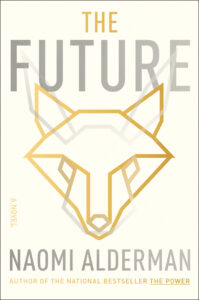
Naomi Alderman, The Future
Simon & Schuster, November 7
The author of The Power is back with another speculative novel that sounds all too close to home: billionaires who will sacrifice the rest of the world for their own safety, social media moguls obsessed with controlling everything in reach, and a mysterious piece of software that saves a survivalist from whoever is hunting her. And, of course, a heist. –ET

Barbra Streisand, My Name is Barbra
Viking, November 7
It’s finally time for Barbra Streisand to emerge from her basement mall and give the fans something to chew on: a tomb of a memoir, clocking in at a whopping 1,024 pages (can that be right?) that tells of the trials, tribulations, but mainly the trophies of an iconic singer and Broadway star. An EGOT winner and 46-time Grammy nominee, Streisand certainly has enough of a life story to fit these many pages; this peek into the vocalist’s upbringing and glamorous career should satisfy any Streisand lover or theater aficionado. –JH
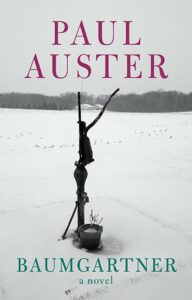
Paul Auster, Baumgartner
Grove Press, November 7
Many of the greatest Anglo-American male novelists of the last 50 years hit their peak in their thirties and forties, and then hung on for dear life trying to understand a culture that inevitably passed them by. Not so Paul Auster, whose distinctly continental, Proustian view of the world is ideally suited to the reflections of age. Auster, 76, brings this studied interiority to the story of Baumgartner, a philosophy professor looking back at a life like any other—all its joys, its tragedies—fully aware that the closer we are to death the more we can live only through our memories. –JD
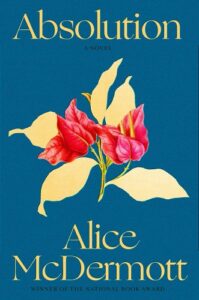
Alice McDermott, Absolution
FSG, November 7
McDermott’s latest is a novel about the Vietnam War, but focuses on a group mostly left out of its story: the American wives who served as “helpmeets” to their husbands in Saigon. It is a novel, as its publisher describes it, “about folly and grace, obligation, sacrifice, and, finally, the quest for absolution in a broken world.” –ET
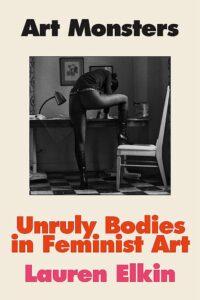
Lauren Elkin, Art Monsters: Unruly Bodies in Feminist Art
FSG, November 14
Inspired by Jenny Offil’s term “art monster”, the phrase coined in 2014 heard round the feminist world, Lauren Elkin takes an embodied approach to monstrosity and feminism with her new book, Art Monsters: Unruly Bodies in Feminist Art. She approaches the topic through a wide range of “visual thinkers”, including artists and writers, and synthesizes a new approach to gaining power for monstrosity. I cannot wait to read this book. –MO
Lexi Freiman, The Book of Ayn
Catapult, November 14
When a writer is canceled after her novel is dismissed as classist, she turns to the Objectivist philosophy of Ayn Rand (as you do), which leads her (of course) to Los Angeles, before it all falls apart and sends her to “a mysterious commune on the island of Lesbos.” Tony Tulathimutte calls it “infuriating, perverse, contrarian, scandalous, nihilistic, and very, very funny,” which makes it exactly the book I want to be reading right now. –ET
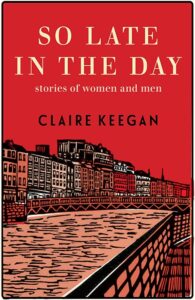
Claire Keegan, So Late in the Day
Grove, November 14
2022 was a banner year for Claire Keegan. Her first book in eleven years, the slim masterpiece Small Things Like These, won the Orwell Prize and was a Booker Prize finalist, and her 2010 novella Foster was adapted into the multi-award-winning (and Oscar-nominated) feature film An Cailín Ciúin. Keegan is widely considered to be one of the finest short story writers Ireland has ever produced, and these three stories—one new, two revised and expanded—demonstrate why.
So Late in the Day: Stories of Women and Men, the title story from which was published in the New Yorker last year, “probe the dynamics that corrupt what could be between women and men: a lack of generosity, the weight of expectation, the looming threat of violence.” –DS
Rebecca Renner, Gator Country: Deception, Danger, and Alligators in the Everglades
Flatiron, November 14
In this work of narrative nonfiction from National Geographic writer Renner—being pitched as “David Grann meets Susan Orlean,” which is very promising if even half true—a Florida fish and wildlife officer goes undercover to ferret out illegal poachers in the Florida Everglades—but all is not as it seems. For anyone who knows their Florida Man birthday headline. –ET
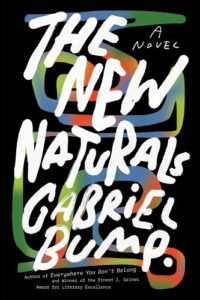
Gabriel Bump, The New Naturals
Algonquin, November 14
After the loss of their child, a Black couple sets out to build a Black utopia, underground and entirely separate from the world above. Besides its ambitious and fascinating premise, this novel has a couple thrilling comp titles: Percival Everett’s The Trees and Paul Beatty’s The Sellout. Count me in. –JG
Michael Cunningham, Day
Random House, November 14
The latest novel from the Pulitzer Prize-winning author of The Hours takes place over three days—three April 5ths, to be exact: in 2019, 2020, and 2021. Yep, it’s a pandemic novel, but of course it is more importantly a novel about a family, and how they weather hardship together. “Michael Cunningham, the perennial master of rendering the quotidian with a profound and deeply considered eye for human frailty, returns with a book that exemplifies the hallmarks of his style: lush, erudite, voracious in its seeking,” writes Ocean Vuong. “Like a true poet, he remakes the world in his descriptions, freshened with care and compassion and tinged with the radiant heat of grief. What a quietly stunning achievement.” –ET
Carmen Maria Machado, J. Robert Lennon, eds., Critical Hits: Writers Playing Video Games
Graywolf Press, November 21
Hell yes. As a writer who plays video games—and who loves so many of the authors included in this essay collection (I’m particularly excited to read Kwame Adjei-Brenyah on Disco Elysium)—I am more than ready. –ET
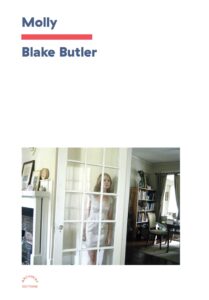
Blake Butler, Molly
Archway, November 21
I’ve been reading—and admiring—Blake Butler’s work for a decade. Many readers might be familiar with his brilliant novel Alice Knott which Riverhead published in 2020, but Molly promises to be something very different. Bulter’s wife, the poet, memoirist, and baker Molly Brodak, took her own life three years into their marriage. Butler had written beautifully about her before, but in Molly he tracks the discovery of a secret, “fundamentally altering his view of their relationship and who she was.” The publisher promises that Molly is a “supremely important work that will be taught, loved, relied on and passed around for years to come,” and I absolutely believe them. –EF


